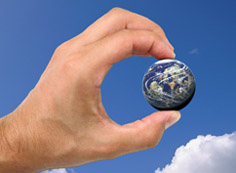Latest News
The Need to Be Sustainable

By Matt Saam, City of West St. Paul
It’s the “buzz word” that’s been around for a while now: Sustainable.
It seems like everyone, and everything, in our industry today wants to use the word. For vendors selling something, if they can somehow tie in the word “sustainable” with their product, it can help boost sales and appeal to both public and private entities. For those designing and constructing projects, if the project can be labeled as sustainable, it is seen as a “good” or “right” way to design the project. There are even environmental incentives and credibility given to a sustainable project in the form of LEED (Leadership in Energy & Environmental Design) or Green Globe points.
Just what is “sustainable” in today’s world? The current online version of Merriam-Webster defines the word in a couple of ways: 1) able to be used without being completely used up or destroyed; and 2) of, relating to, or being a method of harvesting or using a resource so that the resource is not depleted or permanently damaged.
When I read these definitions, ideas such as ongoing or renewable come to mind. To better understand the idea of sustainability, one can look at two areas that utilize the sustainable concept: development and water.
When we talk about sustainable development, it’s much more than green roofs on buildings and the use of recycled materials. It’s the broader concept of development that works for today’s users and will ultimately still be utilized by people in the future. This is quite the opposite of many commercial developments that are constructed in communities with a “slap it up and get it open” mentality.
Proponents of sustainable development believe that there is an interconnectedness between the environment, the economy, and social well-being.
An example of this is close to home -- the planned future community known as UMore Park, located in Rosemount, Minn. At UMore, the University of Minnesota is planning a sustainable development that will, according to their website, “integrate environmental, socio-cultural and economic opportunities with a specific focus on innovations in renewable energy, education and lifelong learning, health and wellness, the natural environment and regional economic development.”
Lately, the sustainable topic has even crept into the previously unchartered waters (excuse the pun) of the drinking water realm. In our area of the country, it seems there has always been a perception that we have an abundance of fresh, clean, and safe drinking water. Sure, most cities have some sort of sprinkling restriction ordinance, and it typically costs more for properties that use more water, but was there previously any serious consideration to the thought of running out of drinking water?
With the recent surface elevation issues with White Bear Lake, some in our industry have questioned the long-term sustainability of the currently popular drinking water supply system, i.e. groundwater well pumping. While I’m not looking to get into that debate in this article, it does raise the question of just how sustainable is the water supply in Minnesota.
Of course not every municipality gets their drinking water from ground wells. Some utilize surface sources, such as rivers, to obtain their water supply. On first blush, one may think that a surface water source would be a good, dependable, and sustainable source of water. But is it? And if it is, not all municipalities are within close proximity to a surface source to make it economically feasible to utilize the surface water. For those cities, groundwater wells may be the only realistic option.
Sustainable, even when unchanging in definition, may be something different depending upon the environment, the economy, and the social well-being of the individual community.
It will be interesting to watch, as the Minneapolis/St. Paul metro area continues to grow, which sustainable water solution will be favored to provide this life-needed nutrient to the increasing populations in each of our communities.
What's New
-

Young Professionals Spotlight
March 25, 2024
-

APWA-MN Education Programs
March 25, 2024
-
Apply for the Young Professionals Stipend: Attend PWX Atlanta
February 23, 2024



